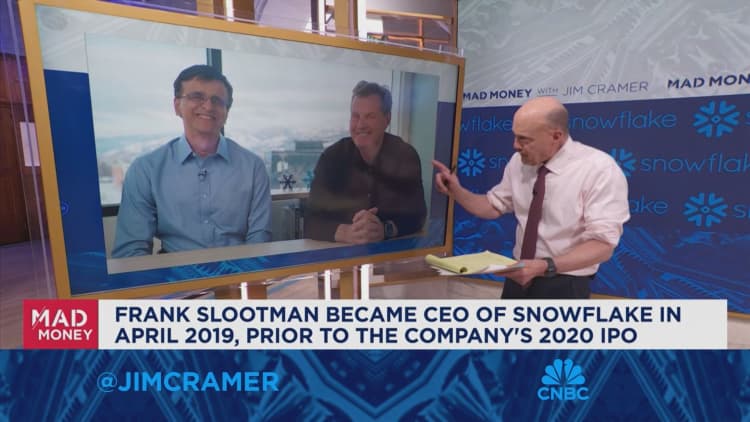Omar Marques | Lightrocket | Getty Images
Cohere President Martin Kon says a lot of the hot artificial intelligence startups on the market today are building the equivalent of fancy sports cars. His product, he says, is more like a heavy-duty truck.
“If you’re looking for vehicles for your field technical service department, and I take you for a test drive in a Bugatti, you’re going to be impressed by how fast and how well it performs,” Kon told CNBC in an interview. However, he said, the price coupled with the space limitations and lack of a trunk will be a problem.
“What you actually need is a fleet of F-150 pickup trucks,” Kon said. “We make F-150s.”
Founded by ex-Google AI researchers and backed by Nvidia, Cohere is betting on generative AI for the enterprise rather than on consumer chatbots, which have been the talk of the tech industry since OpenAI released ChatGPT in late 2022.
In June, Cohere raised $270 million at a $2.2 billion valuation, with Salesforce and Oracle participating in the funding round. Company executives have attended AI forums at the White House. And Cohere is reportedly in talks to raise up to $1 billion in additional capital.
“We don’t comment on rumors,” Kon told CNBC. “But someone once told me startups are always raising.”
The generative AI field has exploded over the past year, with a record $29.1 billion invested across nearly 700 deals in 2023, a more than 260% increase in deal value from a year earlier, according to PitchBook. It’s become the buzziest phrase on corporate earnings calls quarter after quarter, and some form of the technology is automating tasks in just about every industry, from financial services and biomedical research to logistics, online travel and utilities.
Although Cohere is often mentioned alongside AI heavyweights like OpenAI, Anthropic, Google and Microsoft, the startup’s focus on enterprise-only chatbots has set it apart.
Competitors offer AI products for both consumers and businesses. OpenAI, for instance, launched ChatGPT Enterprise in August, and Anthropic opened up consumer access to its formerly business-only Claude chatbot in July.
Kon, who’s also the company’s operating chief, said that by staying focused just on the enterprise, Cohere is able to run efficiently and keep costs under control even amid a chip shortage, rising costs for graphics processing units (GPUs) and ever-changing licensing fees for AI models.
“I’ve rarely seen, in my career, many companies that can successfully be consumer and enterprise at the same time, let alone a startup,” Kon said. He added, “We don’t have to raise billions of dollars to run a free consumer service.”
Current clients include Notion, Oracle and Bamboo HR, according to Cohere’s website. Many customers fall into the categories of banking, financial services and insurance, Kon said. In November, Cohere told CNBC it saw an uptick in customer interest after OpenAI’s sudden and temporary ouster of CEO Sam Altman.
Kon acknowledges that changing dynamics in the hardware industry have presented persistent challenges. The company has had a reserve of Google chips for well over two years, Kon said, secured in Cohere’s early days to help it pretrain its models.
Now, Cohere is moving toward using more of Nvidia’s H100 GPUs, which are powering most of today’s large language models.
Cohere’s relationships with strategic investors are another area where it differs from generative AI competitors, Kon said. Many companies have raised from the likes of Nvidia and Microsoft with some conditions that are tied to use of their software or chips.
Kon is adamant that Cohere has never accepted a conditional investment, and that every check it’s cashed – including from Nvidia – had no strings attached.
“In our last round, we had multiple checks the same size; we had no conditions associated with any one of them,” Kon said. “We explicitly made that decision so we could say we’re not beholden to anyone.”
Cohere’s decision to focus on enterprise-only chatbots may help the company stay out of the murky territory of misinformation concerns, particularly as election season nears.
In January, the Federal Trade Commission announced an AI inquiry into Amazon, Alphabet, Microsoft, OpenAI and Anthropic. FTC Chair Lina Khan described it as a “market inquiry into the investments and partnerships being formed between AI developers and major cloud service providers.” Cohere was not named.
Kon says the company’s growth so far has largely been around areas like search and retrieval, which require their own separate AI models. He calls it “tool use,” and it involves training models on where, when and how to look for information that an enterprise client needs, even if the model wasn’t trained on that data originally.
Search, Kon said, is a key piece of generative AI that’s getting less attention than other areas.
“That’s certainly, for enterprise, going to be the real unlock,” he said.
In discussing the timeline for expansion, Kon called 2023 “the year of the the proof of concept.”
“We think 2024 is turning into the year of deployment at scale,” he said.
Don’t miss these stories from CNBC PRO:
WATCH: Generative AI will democratize access to enterprise data.

Credit: Source link













